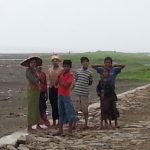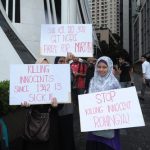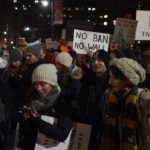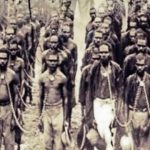Rohingya Muslims Face Humanitarian Crisis
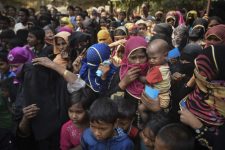
Violence has yet again erupted in Myanmar’s north western Rakhine state, as Rohingya insurgents carried out a series of coordinated attacks on 30 police posts and an army base on August 25.
Staged in the townships of Maungdaw, Buthidaung and Rathedaung, the attacks have resulted in the deaths of 104 people, including 12 members of Myanmar’s security forces and 80 Rohingya militants.
Around 18,500 Rohingya Muslims have fled across the border into neighbouring Bangladesh since clashes began last Friday, while thousands more of the stateless minority have made their way to find temporary shelter in Sittwe, the capital of the chronically impoverished state.
Human Rights Watch reported on Tuesday that satellite data revealed there were widespread burnings in at least 10 areas across the north of the state.
And although it can’t be confirmed, this would be consistent with incidents in 2012 and 2016, where the military and extreme factions of the state’s Rakhine Buddhist majority set about burning down Rohingya villages.
Pushed past the limit
Despite decades of persecution, the Rohingya people had avoided resorting to violence.
However, on October 9 last year, a previously unknown group called Harakah al-Yaqin carried out three attacks on police posts along the Bangladeshi border. This is same group said to be responsible for last Friday’s attacks, now known as the Arakan Rohingya Salvation Army.
Prominent Rohingya rights activist Aung Win predicted to Sydney Criminal Lawyers® in November last year “that if the government continues this way of frustration and depression” it was more than likely a militant group would rise up.
Aung Win lives in a section of Sittwe known as Aung Mingalar. It’s a Muslim ghetto that effectively functions as a prison. It’s fenced off from the rest of the city and the entrances are guarded by police. The movement of the estimated 4,000 Rohingyas that live there is heavily restricted.
Crimes against humanity
Following the border post attack last October, the Myanmar armed forces, officially known as the Tatmadaw, declared the region a “clearance operation zone,” and unleashed sweeping reprisals across the north of the state.
During its operations, the military perpetrated widespread human rights abuses. The Myanmar army and border guard police carried out systematic extrajudicial killings, torture, gang rapes, invasive body searches and sexual assaults.
A report released in February by the UN Office of the High Commissioner for Human Rights outlined that the military’s “calculated policy of terror” in October “cannot be read as an isolated incident.” But, it is part of a decades-long “pattern of violations and abuse” against the Rohingya.
A stateless people
Between October and March this year, 87,000 Rohingya people reportedly fled into Bangladesh. Over the last week, Bangladeshi border guards have been trying to push back those fleeing the current situation.
Since the 1990s, Rohingya people have been fleeing into Bangladesh, and today, there’s an estimated 400,000 living in the country. This is a source of tension between the two nations as both regard these people as the other country’s citizens.
Myanmar denies the estimated 1.1 million Rohingya living in Rakhine state citizenship. The 1982 Citizenship Law doesn’t recognise them as a national ethnic group and only allows citizenship to those who can provide proof that their ancestors lived in the region before 1823.
This is despite there being evidence that the Rohingya were living in the area between the mid-15th to late 18th centuries, if not more than 1,000 years ago.
The Myanmar government actually refers to the Rohingya as Bengalis, which effectively denies them a separate ethnic group. And the term is taken as derogatory by the Rohingya.
Shifting the blame
Myanmar state counsellor Aung San Suu Kyi came under widespread international criticism for her initial lack of response, and then for the approach she took to the violence that was unravelling in Rakhine state last October.
In April, Ms Suu Kyi said that the ongoing violence and persecution of the Rohingya minority did not amount to ethnic cleansing. And in June, the state counsellor refused to grant visas to a UN delegation that was to be sent on a fact-finding mission into the region.
The Nobel Peace Prize winner’s office has recently accused international aid workers in Rakhine state of helping militants in besieging a village. Her office also posted photos of packets of UN World Food Program biscuits allegedly found in a “terrorist” camp on July 30.
Inter-communal violence
Sectarian violence broke out in June 2012, when Rakhine Buddhists began attacking and burning Rohingya villages. The attacks were sparked by the rape and murder of a Buddhist woman at the hands of three Muslim men in Kyaukphyu township.
In October that year, a more coordinated set of attacks was perpetrated upon Rohingya villages in nine townships across the state. The Myanmar forces and local authorities are reported to have either stood by or participated in the attacks. The 2012 riots left around 200 people dead.
The violence drove tens of thousands of Rohingya people into internally displaced persons (IDP) camps throughout the state. Today, around 120,000 Rohingyas still remain in the squalid conditions of the camps.
Between January and March 2015, around 250,000 Rohingya fled the country in boats. In May that year, a humanitarian crisis unfolded in the Andaman Sea, as thousands of Rohingya refugees were stranded in rickety boats, while several Southeast Asian countries refused to allow them entry.
By the end of the month, Malaysia and Indonesia announced they would accept the refugees, as long as they were repatriated or resettled with a year.
Towards a peaceful future
On August 23, the final report of the Advisory Commission on Rakhine State was released. The commission was established in September last year by the Kofi Annan Foundation and the office of Aung San Suu Kyi to propose responses to “the complex challenges facing Rakhine state.”
“Unless concerted action – led by the government and aided by all sectors of the government and society – is taken soon,” former UN secretary general Kofi Annan said at the presentation of the report, “we risk the return of another cycle of violence and radicalisation.”
Amongst its recommendations, the report calls on the Myanmar government to review citizenship laws, allow the Rohingya people freedom of movement, and to implement a strategy to close the IDP camps and return or resettle the residents with “security and livelihood opportunities.”
However, the report doesn’t use the term “Rohingya,” nor the derogatory “Bengali.” It merely refers to the Rohingya as “Muslims.” This was at the request of Ms Suu Kyi. It seems that even as she commissions a report into the Rohingya crisis, she still wants to deny these people their identity.


